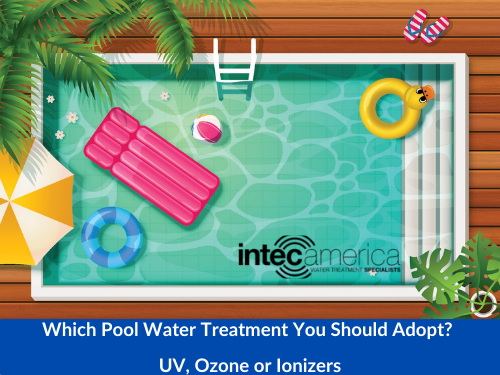Pool water purification and sanitization is no longer restricted to chlorination. Today, pool owners employ various advanced, chlorine-free techniques like ultraviolet (UV), ozonation, and so on for purification and sanitation. All these water purification and sanitization techniques offer absolutely chemical-free water. This leads to hazard-free cleaning and maintenance of pool water. However, since all three techniques offer excellent water purification, the selection of one out of these may be confusing. All three techniques have their own set of advantages, which are proven helpful in pool water sanitization. This post discusses Ozone vs Ionizers vs UV by individually introducing and comparing all three techniques in various aspects.

Before leading to the comparison, let us introduce UV, Ozonation, and Ionization individually.
Ultraviolet (UV): Ultraviolet (UV) pool water sanitization is a technique that uses ultraviolet light/radiation to disinfect water. The UV radiation of wavelength 200-300 nanometers is directed to the pool. The UV radiation is artificially produced by a UV lamp and it penetrates and destroys the DNA of microorganisms.
Ozonation: In this technique, ozone injections or devices called ozonators are utilized. These devices inject ozone (O3) into the pool water in a periodic cycle. Ozone is a variant of oxygen that acts as an effective oxidation agent in water. Like UV radiation, the ozone molecules also disintegrate the DNA of microorganisms. Ozonation is also effective in oxidizing metal contaminations like iron, manganese, etc.
Ionization: The ionizers equipped with sacrificial copper-silver electrodes are used for this purpose. They are usually plumbed in the pool line. These devices produce copper ions on passing the electric current. These copper ions disrupt the enzyme structures of the cell where they rapidly inactivate the cell’s life support system and inhibit their food intake. Ionization is a highly effective chlorine-free water purification technique. Ionization is proven effective to disinfect water against organic contaminants such as bacteria, parasites, germicides, etc. This technique also helps reduce residues of chemical contaminants like chlorine, bromine, and dissolved mineral contaminants like iron, sulphate, etc.
Now that all three techniques of water purification are discussed individually, we can compare them side-by-side. The comparison of UV vs Ozone vs Ionizer pool sanitization system must be done based on a few common factors.
Ozone vs Ionizers vs UV system: Comparison
Since all three methods of water purifications are environment friendly, the comparison between all three can be done based on operation-centric factors.
- Equipment Required: These water sanitization techniques can be compared based on the equipment required.
- The equipment required for ozonation is either ozone generator with venturi injection or an inline UV ozonator. In either application, the ozonator runs every time the pool pump is running.
- Ionization features an electronic controller unit with an inline flow cell containing the copper electrodes. They can be set to run on intermittent levels or run when the pump is running. Solar ionizers are too weak and must use chlorine and are not discussed in this blog.
- UV systems commonly plumbed inline and remain on constantly even if the water is not flowing.
- Disinfection in Comparison to Chlorine: The performance of these techniques is discussed below.
- Ozone is an oxidizing agent which can oxidize organic matter with higher efficiency as compared to chlorine. While chlorine adds taste, and odor while ozonation doesn’t. However, the ozone residual is very short lived and must be constantly added.
- Ionization can reduce or eliminate most chemicals used with swimming pool maintenance. Unlike the halogens chlorine and bromine, temperatures and sunlight to not break it down and has a longer lasting residual compared to any products used in the industry.
- UV systems are more effective than chlorine. However, there is zero residual to handle what is growing in your pool and must be used with other sanitation methods. It is very popular to be used in conjunction with chlorine as UV light disintegrates byproducts such as chloramines.
- By-products: Reaction with contaminations in water may cause some by-products.
- Ozonation forms DBPs like aldehydes, ketones, etc as byproducts. The only ones related to pools are bromates (if bromide is present) which are difficult to remove.
- Ionization forms no harmful by-products.
- UV disinfection does not form any harmful DBPs.
- Chlorination and salt water chlorination can create trihalomethanes (THM), organochlorine, and chloramines.
- Maintenance and Troubleshooting: In terms of maintenance and troubleshooting, these techniques can be compared as follow.
- Ozonators or ozone injections require minimum maintenance as the only refill of ozone may be required.
- Ionizers require the replacement of sacrificial copper electrodes after a few years.
- UV systems require the annual replacement of UV bulbs and frequent cleaning of the quartz sleeve.
Although their designs may vary, these devices with the sole purpose of effective water sanitation. As the difference between ionizer and ozonator or UV device is much clear now, you can select one of these or a combination for your pool sanitization. No matter which system you choose, the quality of equipment must be ensured. That is why you should buy these systems from trusted suppliers like Intec-America. Since 1973, the company has been a prominent supplier of ionizers, UV systems, ozonators, reverse osmosis systems, etc.


